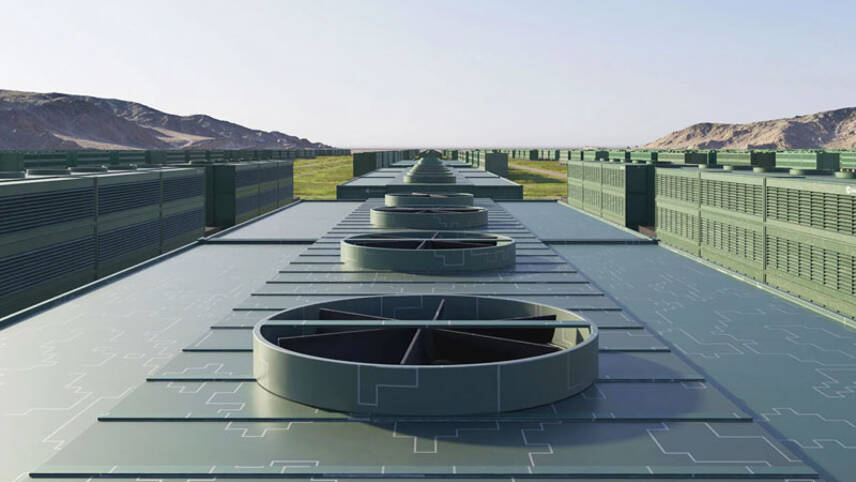Register for free and continue reading
Join our growing army of changemakers and get unlimited access to our premium content

Image: CarbonCapture Inc
The launch of the Hub comes in the same week that Amazon made its first investment in direct air capture (DAC) technology, which is a man-made carbon-sucking solution.
Amazon is describing the Sustainability Solutions Hub as a means to help sellers with their own product and packaging goals, and to align with the retailer’s own initiatives including its net-zero by 2040 target called the Climate Pledge.
Through the Hub, sellers will be able to access the support they need to switch to a ‘ship in own container’ model for packaging. This entails the original manufacturers sending their products in the original box, without additional materials added at Amazon facilities.
Amazon shipped 11% of items sold globally using this approach last year. Next year, all sellers using Fulfilment by Amazon will have the option to use a ‘ship in own container’ approach.
The Hub will also provide free, online training on how sellers can get their products certified as ‘Climate Pledge Friendly’. If they do this, they benefit from increased visibility on the site. Products gain this visibility if they are certified under selected third-party schemes.
Eligible certification schemes include the EU Ecolabel, Fairtrade International, the Rainforest Alliance and Safer Choice. Three new certifications have been added this week – the SCS Recycled Content Standard, ISCC Plus and Plant-Based Fiber Blended. This latter scheme was developed by Amazon and is applicable to textiles.
Amazon had more than 6.3 million total sellers as of late 2021, according to Marketplace Pulse. As such, the Hub could create a ripple effect for changes in packaging and products in the name of reduced environmental impacts.
There may be some interesting changes ahead of the Climate Pledge Friendly Filter in Europe. The EU is clamping down on sustainability-related claims on products. Lawmakers voted in May to support a new directive that will prevent the launch of any additional eco-labels and kick-start a review of existing schemes.
Direct air capture
The launch of the Hub for sellers comes days after Amazon confirmed its first investment in DAC technologies, with a commitment to purchase removal credits for 250,000 tonnes of CO2e over a ten-year period.
For context, Amazon’s total carbon footprint in 2022 was around 71 million tonnes of CO2e when indirect (Scope 3) emissions are included.
Amazon will purchase these credits from the 1PointFive DAC plant in Texas. This facility is not yet operational. It is being developed by Ocy Low-Carbon Ventures, a subsidiary of fossil fuel firm Occidental, with the aim of beginning operations from mid-2025.
1Point5 is aiming for the facility to capture up to half a million tonnes of CO2e each year. It is co-developing storage infrastructure for the captured carbon and has selected underground saline aquifers as its option of choice.
Separately, Amazon’s Climate Pledge Fund made an investment in modular DAC tech firm CarbonCapture Inc. This investment is intended to make 100,000 tonnes of removal credits available to Amazon’s suppliers and selling partners.
No financial details of either of the two deals were revealed. The Climate Pledge Fund launched in June 2022 with a total venture capital pot of $2bn.
Amazon’s vice president of worldwide sustainability, Kara Hurst, said the company’s “primary focus” remains the decarbonisation of its global operations.
Hurst added: “At the same time, we also need to seek every possible avenue to reduce carbon in the atmosphere. Our investments in direct air capture complement our emissions reduction plans, and we are excited to support the growth and deployment of the technology.”
Amazon is not the only corporate making early-stage investments in DAC and other man-made carbon capture technologies that do not yet exist at scale.
Last year, McKinsey & Company, Meta (formerly known as Facebook), Shopify, Stripe, and Google’s parent company Alphabet. Inc made a joint commitment to purchase $925m of credits this decade. Developers will need to prove that their carbon capture and storage costs are $100 per tonne or less to benefit from this investment.
Elsewhere, the links of Microsoft, Ocado, Swiss RE, Audi, LGT and Stripe are supporting Climeworks’ ambition to deliver multiple DAC plants in Europe. Microsoft is also an early corporate backer of enhanced rock weathering for carbon capture.


Please login or Register to leave a comment.